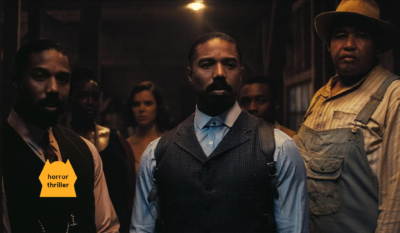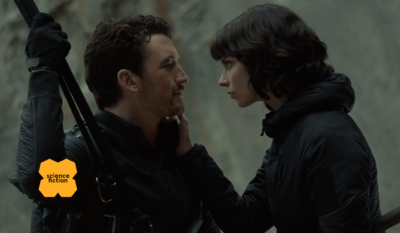Aristotle and Dante Discover the Secrets of the Universe follows two teen boys growing up in Texas in the 1980s as they uncover their identities through their friendship


Aristotle and Dante Discover the Secrets of the Universe is what a young adult coming out story should be. Instead of creating a false idealistic world, director Aitch Alberto plants the movie firmly in something realistic, which makes the very personal journey each of the character’s makes all the more poignant. Max Pelayo and Reese Gonzales have perfect chemistry as Aristotle and Dante and make them feel lived in. Effortlessly charming and emotionally satisfying, Aristotle and Dante makes a grab for the heart and doesn’t let go. I also didn’t want it to.

Notably, the 2012 young adult novel Aristotle and Dante Discover the Secrets of the Universe by Benjamin Alire Sáenz was written and released before the United States Supreme Court legalized same-sex marriage. It’s important to point out because queer media released before comes from a different perspective. A scrappier perspective. One where queer people had a mindset to to protect—and fight. For that reason, watching the movie of the same (very long) title feels like a breath of fresh air among the Love, Simon’s and Heartstoppers of the world.
ADVERTISEMENT
Not that there is anything specifically wrong with either of those projects. They just live in an idealistic version of the queer experience. One where the glass ceiling has been shattered. Aristotle and Dante, on the other hand, takes steps to ground you in a time and place. That time and place: 1987 in El Paso, Texas. Specifically, summer. The hazy, warm cinematography by Akis Konstantakopoulos draws you into a sleepy daze as we meet Aristotle “Ari” Mendoza (Max Pelayo), a Mexican-American high schooler facing down the summer before his junior year the way he usually spends it: alone. That is until he meets Dante Quintana (Reese Gonzales), a fellow teen whose effervescent personality nearly makes him glow in the sun. At least that’s how Ari sees him when he first sees Dante at the pool.
After Dante offers Ari swimming lessons, the pair become fast friends. It’s largely because Dante is in many ways a foil to Ari. He’s aggressively himself—flamboyant, open, excitable. On the other hand, Ari is trapped in his own silence—something that he chides his father (Eugenio Derbez) about. Dante comes from a wealthier family while Ari poorer. Dante’s parents Sam (Kevin Alejandro) and Soledad (Eva Longoria) are very open and expressive while Ari’s parents Jamie and Liliana (Verónica Falcón) are more subdued—reminiscent of the repression of feelings that many immigrant families display. However, Dante helps bring the real Ari out of himself. He helps him become interested in himself.
After a summer of days by the pool, camping trips, and more than one Dante rant about some book or painting, fates separate the two. Something that helps further separate Aristotle and Dante from other young adult stories. It allows the pair time to discover themselves on their own. Ari begins to find his place in his high school and solve the mystery of his parents—this generational trauma storyline is a bit underbaked and I would have loved to spend more time on it. We also see him gaining confidence in himself without Dante by his side. Many people observe that he’s beginning to look like a man. Something that further interrogates why that is a statement to be had.
ADVERTISEMENT
As the movie quickly moves through a year, we hear through letters Dante’s journey to understanding his sexuality. He tells Ari how he came to the conclusion after dating a girl and realizing that he was fantasizing about a boy instead. Gonzales is able to communicate his struggle and trepidation about coming out with his voiceover, which Pelayo reacts to with silent emotion. It’s what makes Aristotle and Dante such a successful book-to-movie adaptation. Director Aitch Alberto is okay to live in those introspective silences—something particularly important for a repressed character like Aristotle.
Coming out stories are difficult to pull off because they’re such singular experiences that differ from person to person. They’re largely an internal dialogue that we have to have (or not have) with ourselves. Yet, at this point, it feels like we’ve seen so many of the same versions. In that way, Aristotle and Dante Discover the Secrets of the Universe feels like a breath of fresh air—or a clear sky full of stars (with no light pollution). Most obviously because of the focus on two Latino characters—groundbreaking for a genre that is very white-washed. But more importantly because it doesn’t try to pretend that it’s a perfect experience. What it does say is that there is magic to be had—and that you can hold the universe in the palm of your hand.
ADVERTISEMENT
More movies, less problems
- Jordan Peele Unleashes the First Trailer for ‘HIM’
- ‘Sinners’ is the best movie of the year | movie review
- Romantic sci-fi thriller ‘The Gorge’ hits its mark | movie reivew
Hey! I’m Karl. You can find me on Twitter and Letterboxd. I’m also a Tomatometer-approved critic.
💌 Sign up for our weekly email newsletter with movie recommendations available to stream.
ADVERTISEMENT
Hey, I'm Karl, founder and film critic at Smash Cut. I started Smash Cut in 2014 to share my love of movies and give a perspective I haven't yet seen represented. I'm also an editor at The New York Times, a Rotten Tomatoes-approved critic, and a member of the Online Film Critics Society.


Comments are closed.